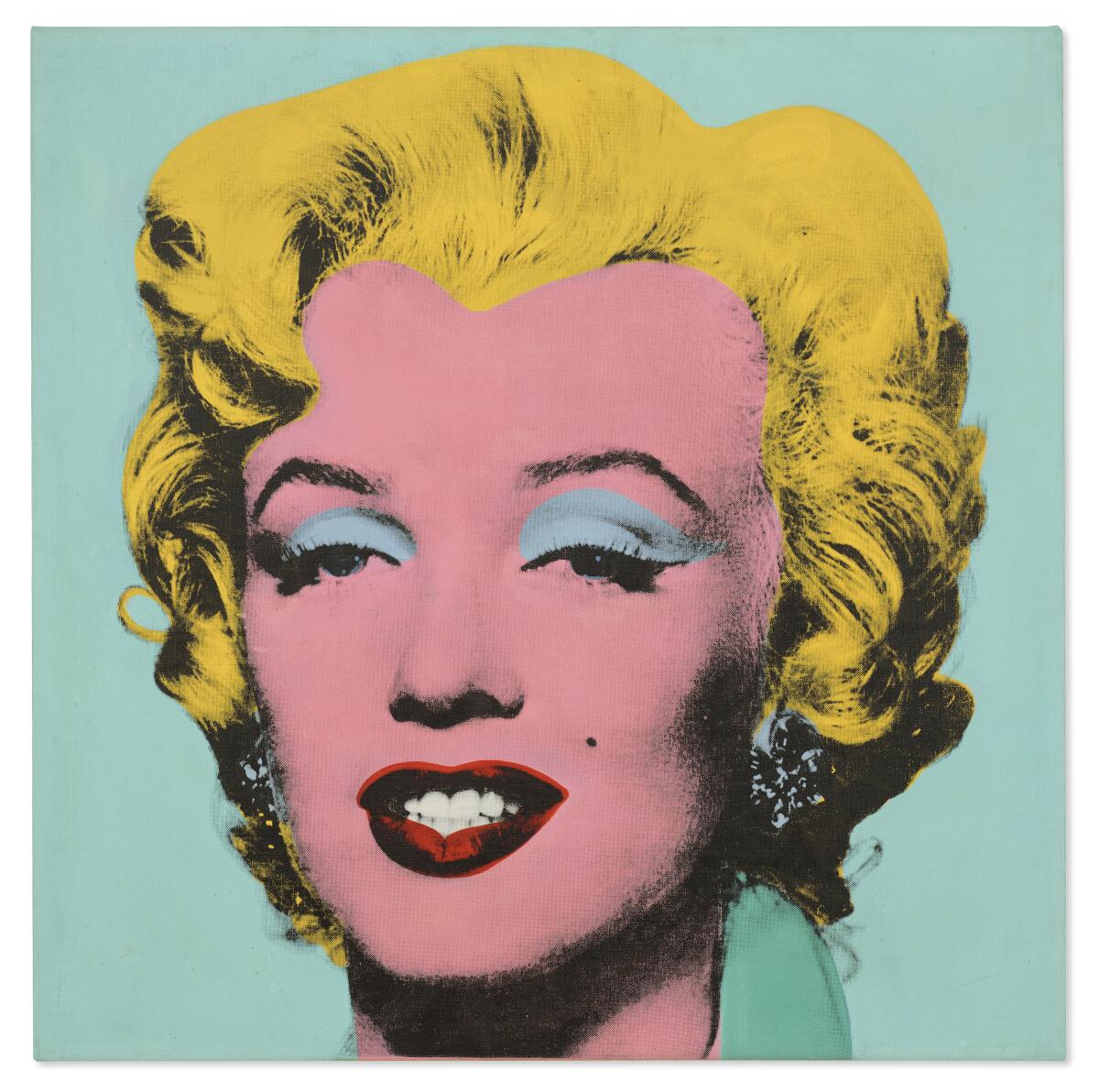Sold for $195 million, Andy Warhol’s ‘Shot Sage Blue Marilyn’ sets new auction record

Andy Warhol’s iconic “Shot Sage Blue Marilyn” set a new record Monday night as the most expensive 20th century artwork ever to sell at auction.
The 1964 work — a 40-square-inch acrylic and silk screen on linen — sold at Christie’s in New York for $195 million (hammer price plus buyer’s premium), the auction house reported. The buyer, who was present at the auction, was Larry Gagosian. Prior to Monday, the auction sale record for a 20th century painting was $179.4 million for Pablo Picasso’s “Les Femmes d’Alger (Version O),” which sold at Christie’s in May 2015.
“Shot Sage Blue Marilyn” is part of a five-painting series, four of which are referred to as the “Shot Marilyns” (more on that later, but suffice to say it involves a performance artist and a gun). Prior to the sale, it was estimated to sell “in the region of $200 million,” said Johanna Flaum, head of post-war and contemporary art at Christie’s — meaning the painting also set a record as the highest pre-auction estimate for any artwork, of any period, to date. The estimate surpasses Leonardo da Vinci’s “Salvator Mundi,” which was calculated to sell for $100 million in advance of a November 2017 Christie’s sale. (It ended up going for $450 million.)
“Shot Sage Blue Marilyn” is one of Warhol’s most significant images of Monroe, a signature work in his oeuvre and a cornerstone of Pop Art.
“When we think of the most iconic images of art history,” said Flaum, “we think of paintings like Da Vinci’s ‘Mona Lisa’ and Botticelli’s ‘The Birth of Venus’ and Picasso’s ‘Les Demoiselles d’Avignon.’ This is that same lineage — it’s that iconic image from the second half of the 20th century. And, in a very Warholian way, has been reproduced endlessly.”
Warhol never met Monroe in person, but he painted her image dozens of times, beginning after she died of an overdose in 1962. There’s the “Gold Marilyn Monroe” (1962), now on view at the Museum of Modern Art in New York; the 50-image “Marilyn Diptych” (1962), on view at the Tate Modern in London; and the “Marilyn (Reversal Series),” multiple silk screens produced between 1979-1986, in which the tonal values in the works are reversed, like a photographic negative, among others.
In 1964, Warhol painted five Monroe works — “Shot Sage Blue Marilyn” was one of them — using a precise but laborious technique that resulted in a particularly beautiful and aligned silk screen.
“They have an extraordinary quality when you stand in front of them,” Flaum said of those works. “But it took too long for him [to execute], frankly, as someone whose studio was referred to as the Factory, and he never went back to that technique. So these Marilyns stand as these unbelievable examples [of silk-screening] and are very rare.”
The “Shot Marilyns” are aptly named. In the fall of 1964, Warhol had just created the five, 40-square-inch Monroe paintings — one in sage blue, one described as light blue, and red, orange and turquoise ones. Four of them (all but the turquoise) were stacked in his studio when a friend brought performance artist Dorothy Podber to Warhol’s studio. She asked to shoot the four works, and when Warhol obliged, thinking she was going to take pictures, she pulled out a gun and shot the canvases, piercing holes in several of them. They were subsequently repaired, but the name stuck.
“Shot Sage Blue Marilyn” was originally purchased by New York advertising executive and Pop Art collector Leon Kraushar. Among its other owners: contemporary art dealer Fred Mueller, who acquired it in the early ’70s, as well as S.I. Newhouse, of the Condé Nast empire, who also purchased it around then. The late Swiss art dealer Thomas Ammann — who co-founded Thomas Ammann Fine Art in 1977 in Zürich with his sister Doris Ammann — purchased “Shot Sage Blue Marilyn” in the early ’80s.
The Monroe work was offered for auction by the Thomas and Doris Ammann Foundation, a new charity formed after Doris Ammann passed away last year. More than 100 works from their private collection are being sold during two live auctions (the second is a day sale on May 13). One hundred percent of the proceeds from both sales, minus the buyers’ premiums, will go to the foundation’s efforts dedicated to healthcare and education for underprivileged children internationally.
Which sets another record: The event is the “highest value philanthropic sale at auction,” Flaum said, since Christie’s sold the collection of Peggy and David Rockefeller in 2018 for $835 million.
Monday’s sale is significant for yet another reason: “Every time one of these 40-inch Marilyn paintings comes to market,” Flaum said, “it resets the market for Warhol, but also the entire contemporary art market.”
Many Warhol paintings of Monroe have come to auction over the years, she added, “but they don’t hold a candle to this series in terms of significance. They’re just not of the same caliber in terms of rarity and demand.”
More to Read
The biggest entertainment stories
Get our big stories about Hollywood, film, television, music, arts, culture and more right in your inbox as soon as they publish.
You may occasionally receive promotional content from the Los Angeles Times.











